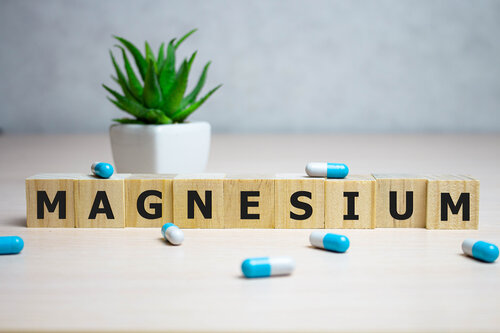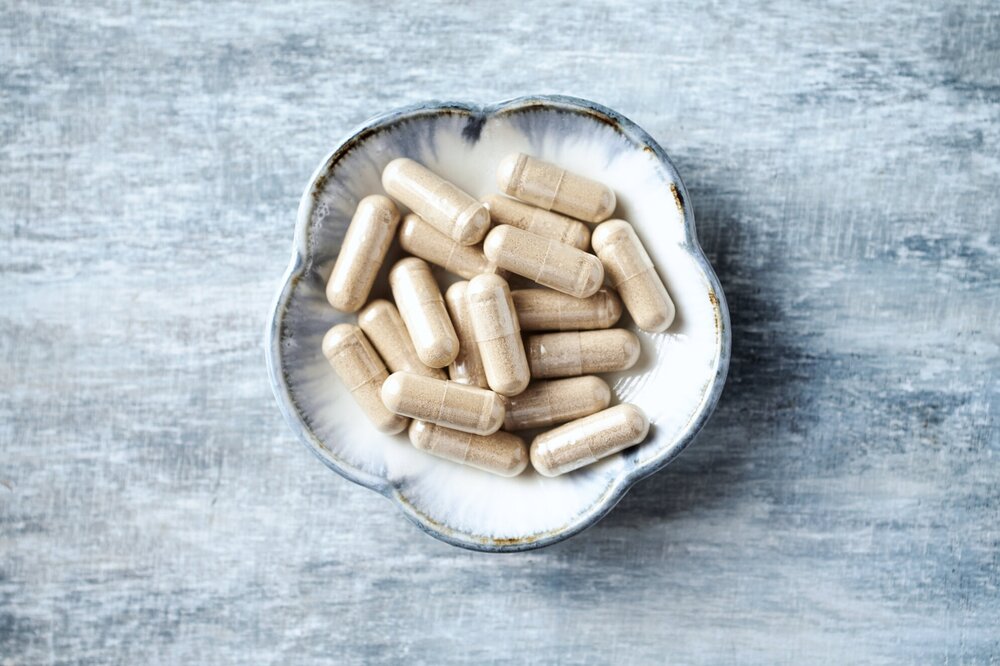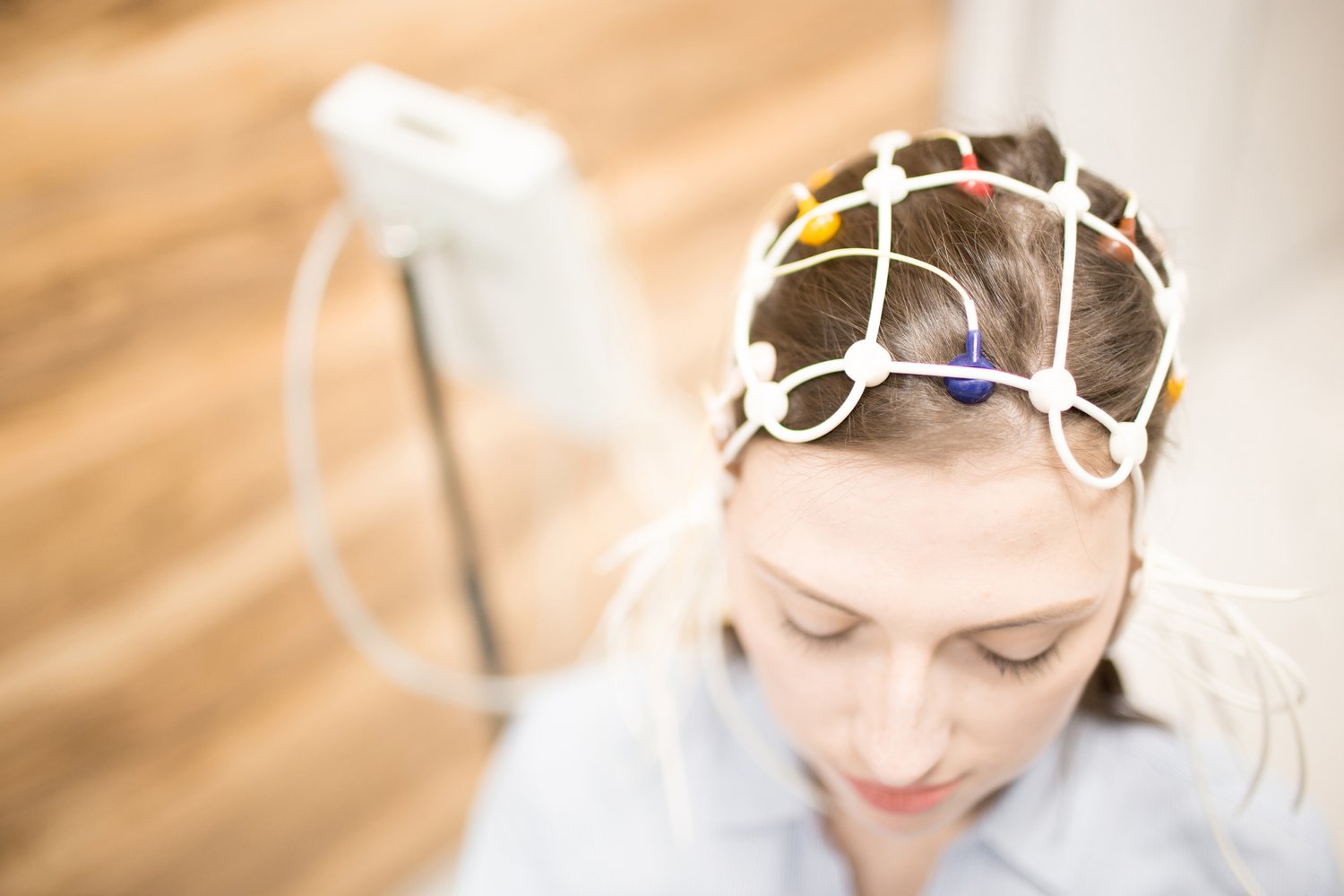In my psychiatry practice, I have seen how patients can struggle for months, or even years, to find the right treatment for their depression. Unfortunately, only 46% of patients improve with antidepressants and talk therapy. Even those who get better with standard treatment may have only partial improvement or experience uncomfortable side effects.
One of the reasons why antidepressants don’t help everyone fully is because depression is more than a simple chemical imbalance. In fact, depression is a complex condition that has root causes throughout the body, not just the brain.
Nutritional supplements allow us to address different biological pathways that are involved in depressive disorders. In this article, we share the seven supplements for depression that have the most evidence based on research and our clinical experience:
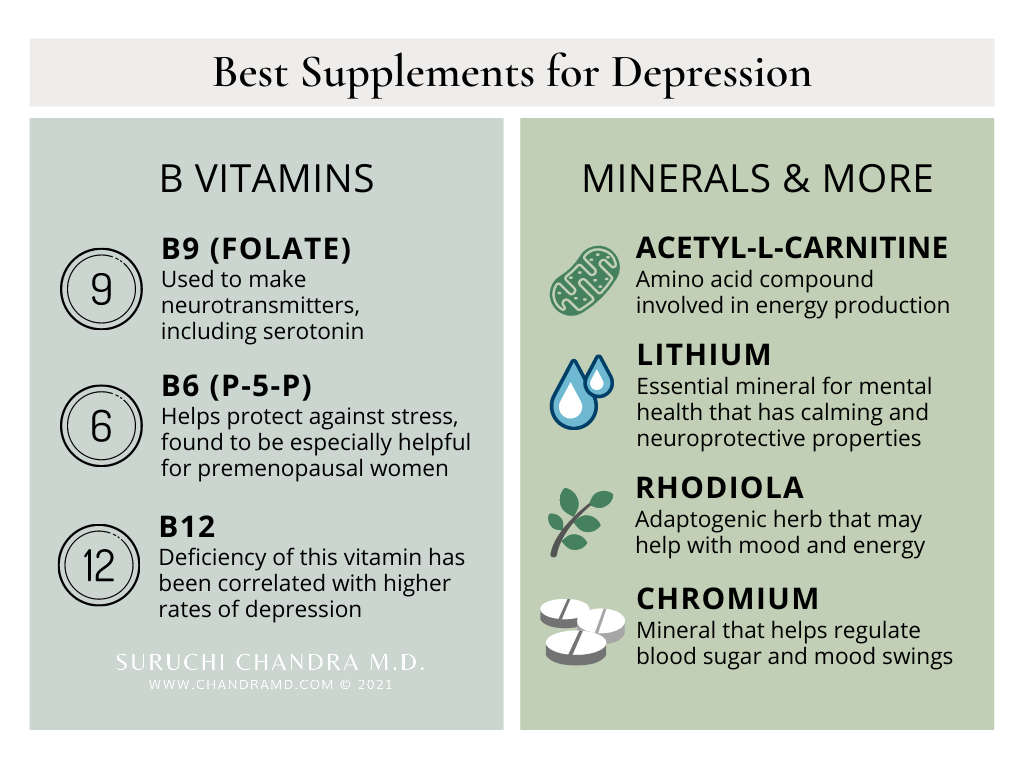
Natural Supplements for Depression: Acetyl-L-Carnitine, Lithium, Rhodiola, and Chromium
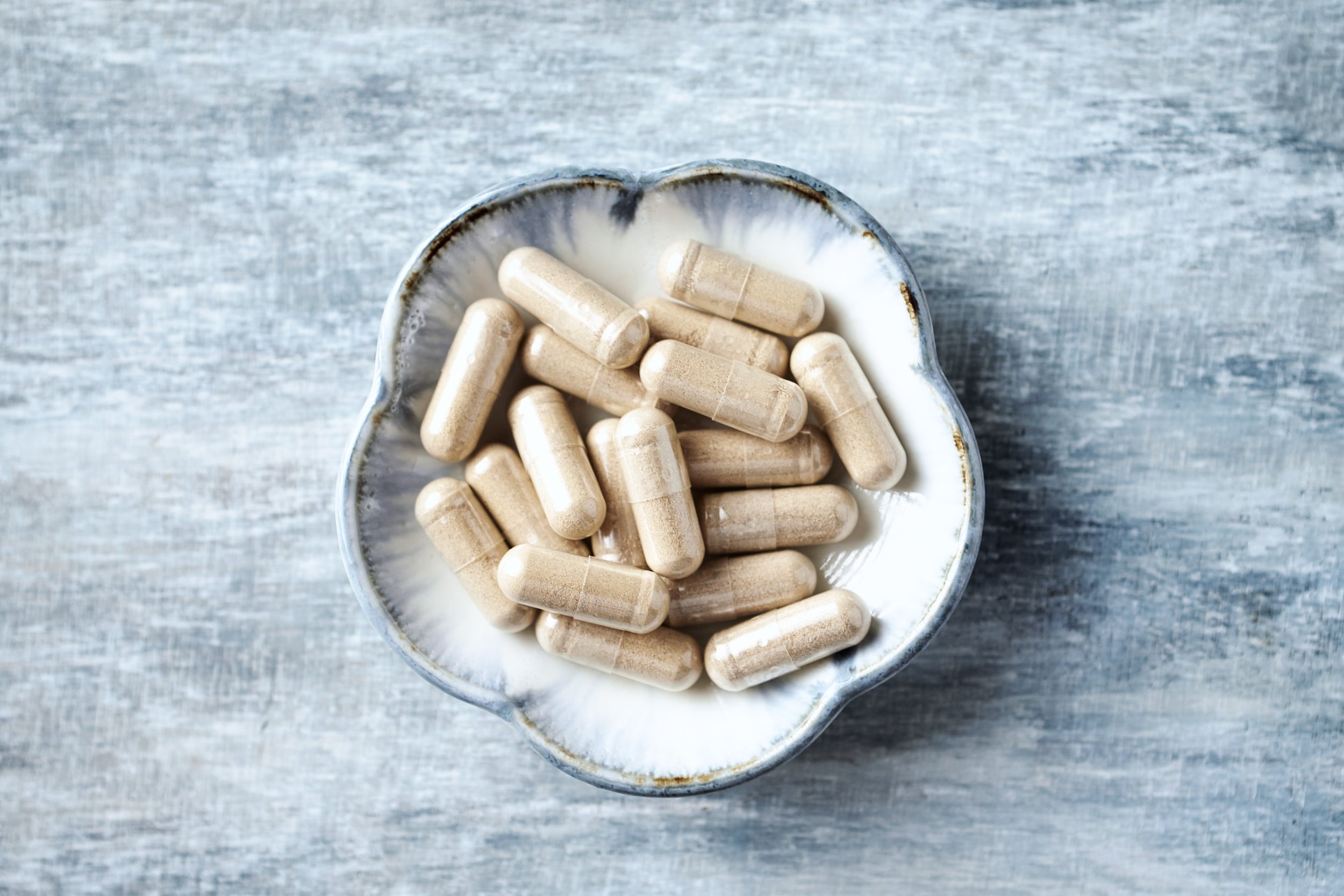
Acetyl-L-Carnitine
What is it? How does it help with depression? Acetyl-l-carnitine is a form of carnitine, a compound that supports mitochondria, or the powerhouse of our cells. This acetyl form can enter the brain more easily, where it helps produce energy and increase the brain’s ability to heal and adapt.
Research shows that patients with depression may have lower levels of acetyl-l-carnitine. Some trials found that supplementing with acetyl-l-carnitine may significantly reduce depressive symptoms. The findings of one trial suggested that it may even be as effective as some medications, but with far fewer side-effects. Animal studies show that it may have effects as early as 3 days into treatment, which suggests that carnitine may offer more immediate relief for patients while they wait for other therapies to become effective.
Are there side-effects or other concerns? Carnitine is generally well tolerated, and adverse effects have rarely been reported in research studies. The most commonly reported side-effects were gastrointestinal symptoms such as nausea, abdominal cramping, and diarrhea.
Dosing & brands we like: Studies have typically used 1000 to 2000mg a day in divided doses (e.g. 500mg or 1000mg twice a day). Allergy Research Group offers 500mg capsules.
The take-away: Acetyl-l-carnitine tops our list because it is one of the most promising supplements for depression. It has the potential to help patients with depression with few side-effects, and animal studies suggest it may work faster than standard medications.
Low-Dose Lithium Supplements
What is it? How does it help with depression? Lithium is an essential mineral that helps encourage the growth of new brain cells, protect the brain, and calm the nervous system.
When most people hear the word “lithium,” they think of the heavy-duty medication, which contains about 112 to 225mg of lithium and can have serious side-effects. However, there is a growing body of evidence supporting the use of low-dose lithium medications and supplements for depression:
- Low-dose lithium medication (20 to 110mg) has been found to protect against future episodes of depression and suicidality in those who have had depression in the past.
- Even those taking trace levels of lithium (roughly 0.4mg) have experienced improved mood during a four-week period.
- Those who get more lithium from their local water supply tend to have lower rates of suicide in countries across the world.
Are there side-effects or other concerns? The side-effects and toxicity associated with lithium are usually only seen with the higher doses used in lithium medications or lithium orotate. For this reason, patients taking these forms should always consult with a medical professional.
For trace or micro-levels of lithium, there are virtually no known side-effects. Dr. Anna Fels, professor of psychiatry at Cornell and published in the New York Times, said,
>
“There’s enough evidence that people should have the option of taking micro doses [of lithium], especially since there seemed to be no downside to it … There’s very suggestive evidence that it’s useful in terms of reducing impulsivity, irritability, suicidality.”
— Dr. Anna Fels
Dosing & brands we like: As a supplement, lithium is typically available in doses from 0.125 to 5mg. This is about the same amount that we consume in a day from our food and water, which is between 0.64 – 3mg according to the U.S. Environmental Protection Agency. New Beginnings offers a liquid lithium supplement, and Biotics Research produces a plant-based lithium supplement.
The take-away: At low doses, lithium appears to be safe, well tolerated, and have beneficial effects for mental health. Those using higher doses of lithium orotate should always consult with a medical professional.
Low-dose lithium supplements deserve more attention from the scientific community as a potential support for mood disorders. Learn more about low-dose lithium supplements here on our website.
Rhodiola Herbal Supplement
What is it? How does it help with depression? Rhodiola is an herb that has been used for centuries by those in regions of Asia to help manage stress and fatigue.
One trial found Rhodiola to be helpful for depression, though less so than sertraline (i.e. Zoloft), a commonly prescribed antidepressant medication. However, given the minimal side effects of Rhodiola, the researchers suggested that it may be a good option for those with mild to moderate depression. Another study found that Rhodiola may also help with insomnia, fatigue, and anxiety in patients with mild or moderate depression.
Are there side-effects or other concerns? Rhodiola is generally well tolerated with only mild side-effects, most commonly dizziness and dry mouth.
Dosing & brands we like: Rhodiola can be found in both capsule and liquid forms. Dosing recommendations depend on the concentration and formulation of the supplement and are usually indicated on the label.
The take-away: Rhodiola appears to be a better option for those with milder cases of depression, especially those who also struggle with fatigue or anxiety.
Chromium
What is it? How does it help with depression? Chromium is a trace mineral that supports serotonin function and blood sugar regulation. Many of us know what it’s like to feel “hangry.” This is because if you haven’t eaten in a while, your blood sugar can dip, which may lead to feelings of anger and, in some people, sadness and mood swings.
In one trial, patients with atypical depression had a significant improvement in mood swings, appetite regulation, and carbohydrate cravings with chromium. In a separate case series, researchers found that 8 patients with treatment-resistant depression also experienced dramatic improvement in their symptoms and functioning with chromium supplementation.
Are there side-effects or other concerns? Supplements use the trace element form of chromium, which is generally safe and differs from the form used for industrial purposes. While chromium is typically well-tolerated, there have been rare reports of kidney problems with those taking large amounts of chromium supplements.
Doing & brands we like: In studies with depressed patients, researchers typically administered 400-600mcg in divided doses (i.e. 200 to 300mcg twice a day). Bio-Tech Pharmacal offers 200mcg capsules.
The take-away: Chromium seems to be helpful for a subset of patients with depression who are prone to low blood sugar or carbohydrate cravings throughout the day.
Vitamins for Depression: B9, B6, and B12
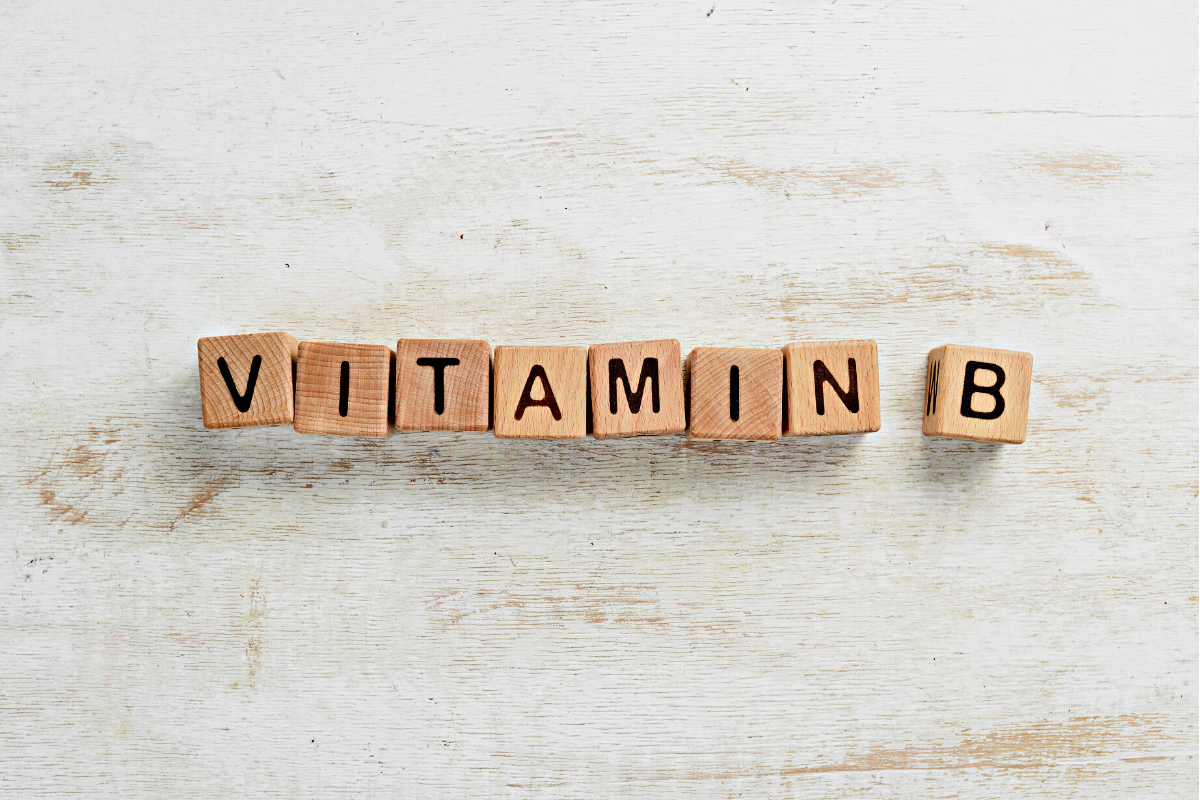
Vitamin B9 (Folate)
What is it? How does it help with depression? Vitamin B9, also known as folate, helps make neurotransmitters such as serotonin, norepinephrine, and dopamine. Those with lower levels of folate are more likely to experience depression and less likely to respond to antidepressant medications.
Of all the B vitamins, folate has some of the strongest evidence for its use in treating depression:
- Some research studies have found that high-dose methylfolate may be as effective as some antidepressant medications.
- Researchers also found that patients with the MTHFR mutation, a gene variant associated with depression, may improve with methylfolate supplementation.
- In a recent study from 2021, patients who took their SSRI medications with L-methylfolate had twice the response rate compared to patients who took SSRIs alone.
Are there side-effects or other concerns? In studies, folate supplements at the low levels similar to multivitamins (0.4 to 2mg) were generally well tolerated with few side-effects. However, higher doses may carry the risk of other adverse effects, including agitation and activation.
There is some concern that folate supplementation may hide or “mask” B12 deficiency. In response, some medical professionals recommend supplementing with folate and B12 at the same time.
Dosing & brands we like: Although folate is available in different forms, many doctors and researchers believe methylfolate (also known as 5-MTHF) may be the preferred form for psychiatric conditions because it enters the brain more easily and can be used more efficiently. Methylfolate is available at higher doses as Deplin, a prescription medical food for the dietary management of depression.
The ideal dose of folate for depression is still unknown. Until we have more data, some medical professionals recommended sticking with lower doses (0.4 to 1mg) of folate supplementation a day along with B12 for depression. Jarrow Formulas makes both 0.4mg and 1mg capsule versions.
The take-away: Vitamin B9, or folate, plays a critical role in supporting neurotransmitters in the brain. A growing body of evidence shows that it may be helpful in treating depression, including in those who were previously unresponsive to antidepressants or those with the MTHFR gene mutation.
Preliminary evidence suggests that methylfolate may be the most efficient form of B9, but more research is needed to determine optimal dosing.
Vitamin B6 (P-5-P)
What is it? How does it help with depression? Vitamin B6 (also known as P-5-P) helps protect us from the harmful effects of stress. Over an extended period of time, stress can make us more vulnerable to depression by making us feel overwhelmed and even changing our biology. B6 helps produce calming neurotransmitters, including serotonin and GABA, which can help us cope with stress.
One review found that B6 may be especially helpful for premenopausal women with depression, and the authors recommended further research into B6 as a therapy for hormone-related depression in women.
Are there side-effects or other concerns? We regularly consume B6 from our food, so it is considered safe within normal levels. The NIH reports upper limits of B6 between 30 – 80mg per day for children and under 100mg per day for adults. Most documented cases of toxicity occurred with long-term use and very high doses at 1000mg a day or more. The most common side-effects of toxic levels of B6 are sensory neuropathy and impaired balance or coordination.
Dosing & brands we like: The NIH recommends between 0.5 – 1.3mg per day for children and 1.3 – 1.9mg per day for adults, depending on age or gender. However, some studies have found that certain groups, including oral contraceptive users, may need more to reach optimal blood levels of B6. Klaire Labs and Designs for Health make capsule versions of P-5-P, the most bioavailable form of B6.
The take-away: Having optimal levels of B6 may help protect us from the effects of stress, including depressive symptoms. Researchers have found that premenopausal women in particular may benefit from B6 supplementation.
Vitamin B12
What is it? How does it help with depression? Vitamin B12 helps to produce red blood cells and support a healthy brain and nervous system. Lower levels of B12 have been associated with a higher risk of developing depression. However, supplementing with B12 has not been found to relieve symptoms of depression in the short term.
In other words, taking B12 supplements may not improve someone’s mood over a day or weeks, but it does appear to help prevent future episodes of depression over a longer period of time.
Are there side-effects or other concerns? B12 is usually well-tolerated and considered safe, even at higher doses.
Dosing & brands we like: B12 is best taken sublingually (e.g. under the tongue) for optimal absorption. Klaire Labs offers a liquid version in 1mg and 5mg.
The take-away: B12 is important for brain health, and doctors may recommend testing B12 levels in those with or at risk for depression. However, B12 appears to be more effective as a long-term preventative measure against future episodes of depression rather than as a short-term solution.
Other Questions for Depression Supplements
Can I take more than one of these supplements for depression? Because depression is a complex condition that often involves more than one root cause, it’s not unusual for patients to need multiple supportive treatments. Some people may benefit from a vitamin B complex so that they can have adequate, balanced levels of various B vitamins, including B9 and B6. Integrative Therapeutics and Thorne both offer vitamin B complexes.
What populations are these supplements safe for? While these supplements are generally safe, there are some groups that may be at higher risk for side-effects and should consult with a medical professional before starting any new supplements, including:
- Women who are pregnant or breastfeeding
- Infants and young children (unless otherwise noted)
- Those on prescription medications (for potential drug interactions)
- Those with chronic medical conditions
Our Favorite Natural Supplements for Depression
We trust the following products based on their quality and our clinical experience:
Acetyl-L-Carnitine: Allergy Research Group
Lithium: New Beginnings (liquid) & Biotics Research (capsules)
Rhodiola: Herb Pharm (liquid) & Gaia Herbs (capsules)
Chromium: Bio-Tech Pharmacal
Vitamin B9 (Folate): Jarrow Formulas (0.4mg or 1mg capsules)
Vitamin B6 (P-5-P): Klaire Labs & Designs for Health
Vitamin B12: Klaire Labs
Vitamin B Complexes: Integrative Therapeutics & Thorne
We are not endorsed by, directly affiliated with, maintained, authorized, or sponsored by any of these brands. All product and company names are the registered trademarks of their original owners.
New Ways to Recover from Depression
Patients with depression are often frustrated by the limitations of current treatment options. However, nutritional supplements offer the chance to address the various complex issues that can contribute to depression, such as mitochondrial dysfunction or folate deficiency.
Partnering with a doctor who considers comprehensive testing and treatment and uses a functional medicine approach to mental health may help you better understand these issues and find new avenues for healing.
References
1. “Chromium treatment of depression” – International Journal of Neuropsychopharmacology (2000), DOI: 10.1017/S146114570000208X
2. “A double-blind, placebo-controlled, exploratory trial of chromium picolinate in atypical depression: effect on carbohydrate craving” – Journal of Psychiatric Practice (2005), DOI: 10.1097/00131746-200509000-00004
3. “Folate and depression—a neglected problem” – Journal of Psychiatry & Neuroscience (2007), PMCID: PMC1810582
4. “The relationship between dietary patterns and depression mediated by serum levels of Folate and vitamin B12” – BMC Psychiatry (2020), DOI: 10.1186/s12888-020-2455-2
5. “Clinical trial of Rhodiola rosea L. extract SHR-5 in the treatment of mild to moderate depression” – Nordic Journal of Psychiatry (2007), DOI: 10.1080/08039480701643290
6. “Rhodiola rosea versus sertraline for major depressive disorder: A randomized placebo-controlled trial” – Phytomedicine (2015), DOI: 10.1016/j.phymed.2015.01.010
7. “Rhodiola rosea therapy for major depressive disorder: a study protocol for a randomized, double-blind, placebo-controlled trial” – Journal of Clinical Trials (2014), DOI: 10.4172/2167-0870.1000170
8. “Systematic review and meta-analysis of randomized placebo-controlled trials of folate and vitamin B12 for depression” – International Psychogeriatrics (2015), DOI: 10.1017/S1041610215000046
9. “Acetyl-l-carnitine deficiency in patients with major depressive disorder” – Proceedings of the National Academy of Sciences (2018), DOI: 10.1073/pnas.1801609115
10. “L-Carnitine and Acetyl-L-Carnitine: Potential Novel Biomarkers for Major Depressive Disorder” – Frontiers in Psychiatry (2021), DOI: 10.3389/fpsyt.2021.671151
11. “A review of current evidence for acetyl-l-carnitine in the treatment of depression” – Journal of Psychiatric Research (2014), DOI: 10.1016/j.jpsychires.2014.02.005
12. “Myriad of implications of acetyl-l-carnitine deficits in depression” – Proceedings of the National Academy of Sciences (2018), DOI: 10.1073/pnas.1811389115
The information and any products mentioned in this article are not intended to diagnose, treat, cure, or prevent any disease. The information provided is for educational purposes only and not intended to replace the relationships with your physician(s). Before initiating any conventional or integrative treatments, please first consult with a licensed medical provider. Please review references cited at the end of article for scientific support of any claims made.
Suruchi Chandra, MD
By
January 26, 2022
|

